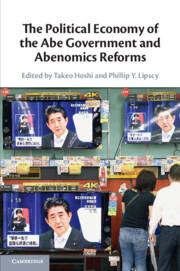Book contents
- The Political Economy of the Abe Government and Abenomics Reforms
- The Political Economy of the Abe Government and Abenomics Reforms
- Copyright page
- Dedication
- Contents
- Figures
- Tables
- Contributors
- Acknowledgments
- Abbreviations
- Part I Introduction
- Part II Political Context
- Part III Macroeconomic Policy
- Part IV Third Arrow of Abenomics
- Part V Foreign Policy
- Index
- References
Part V - Foreign Policy
Published online by Cambridge University Press: 05 February 2021
- The Political Economy of the Abe Government and Abenomics Reforms
- The Political Economy of the Abe Government and Abenomics Reforms
- Copyright page
- Dedication
- Contents
- Figures
- Tables
- Contributors
- Acknowledgments
- Abbreviations
- Part I Introduction
- Part II Political Context
- Part III Macroeconomic Policy
- Part IV Third Arrow of Abenomics
- Part V Foreign Policy
- Index
- References
- Type
- Chapter
- Information
- Publisher: Cambridge University PressPrint publication year: 2021



